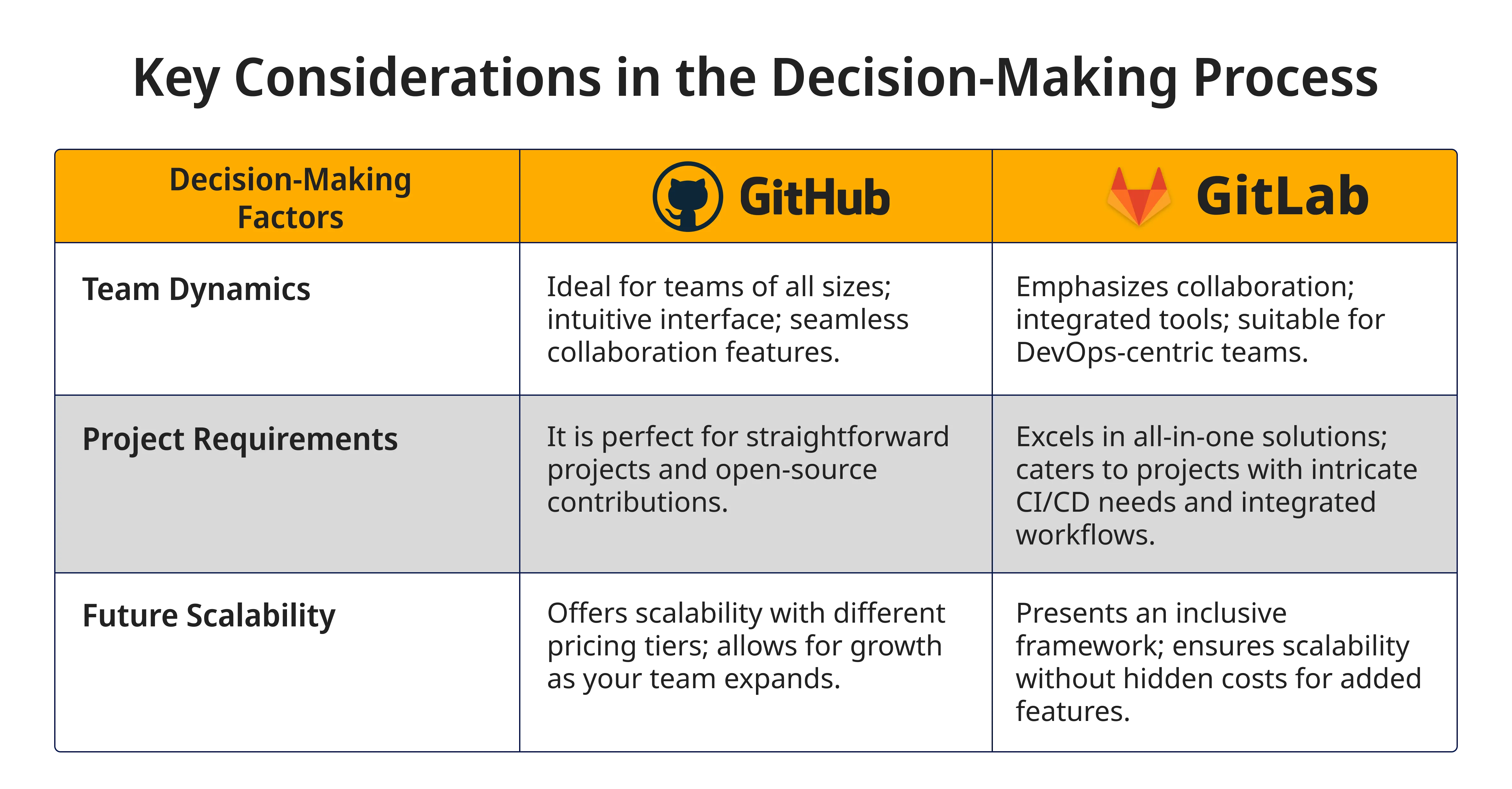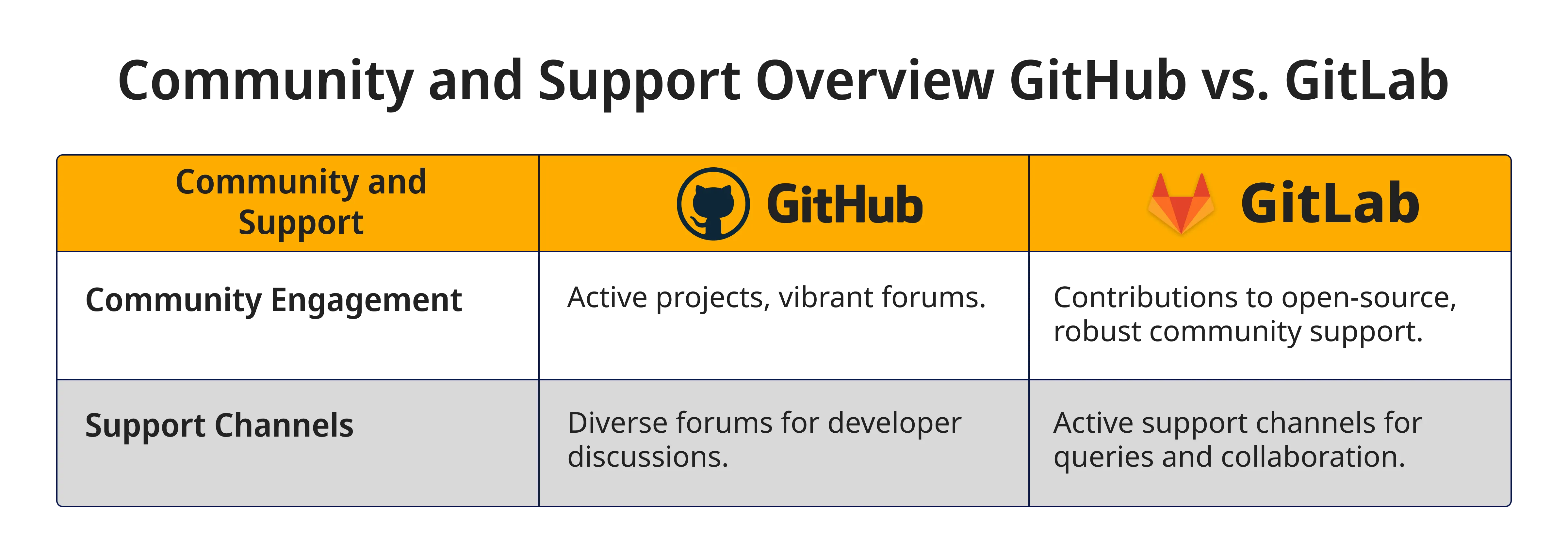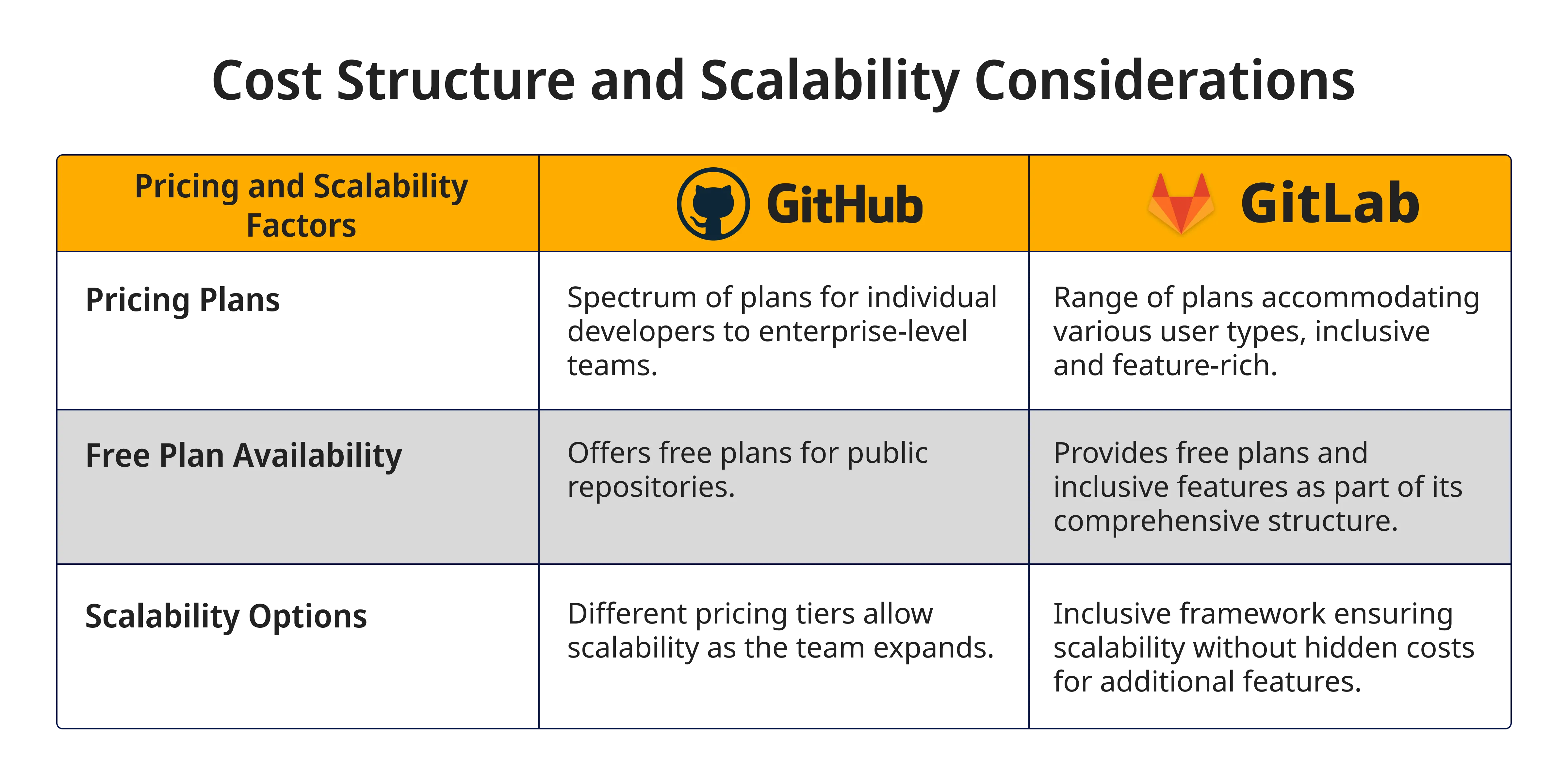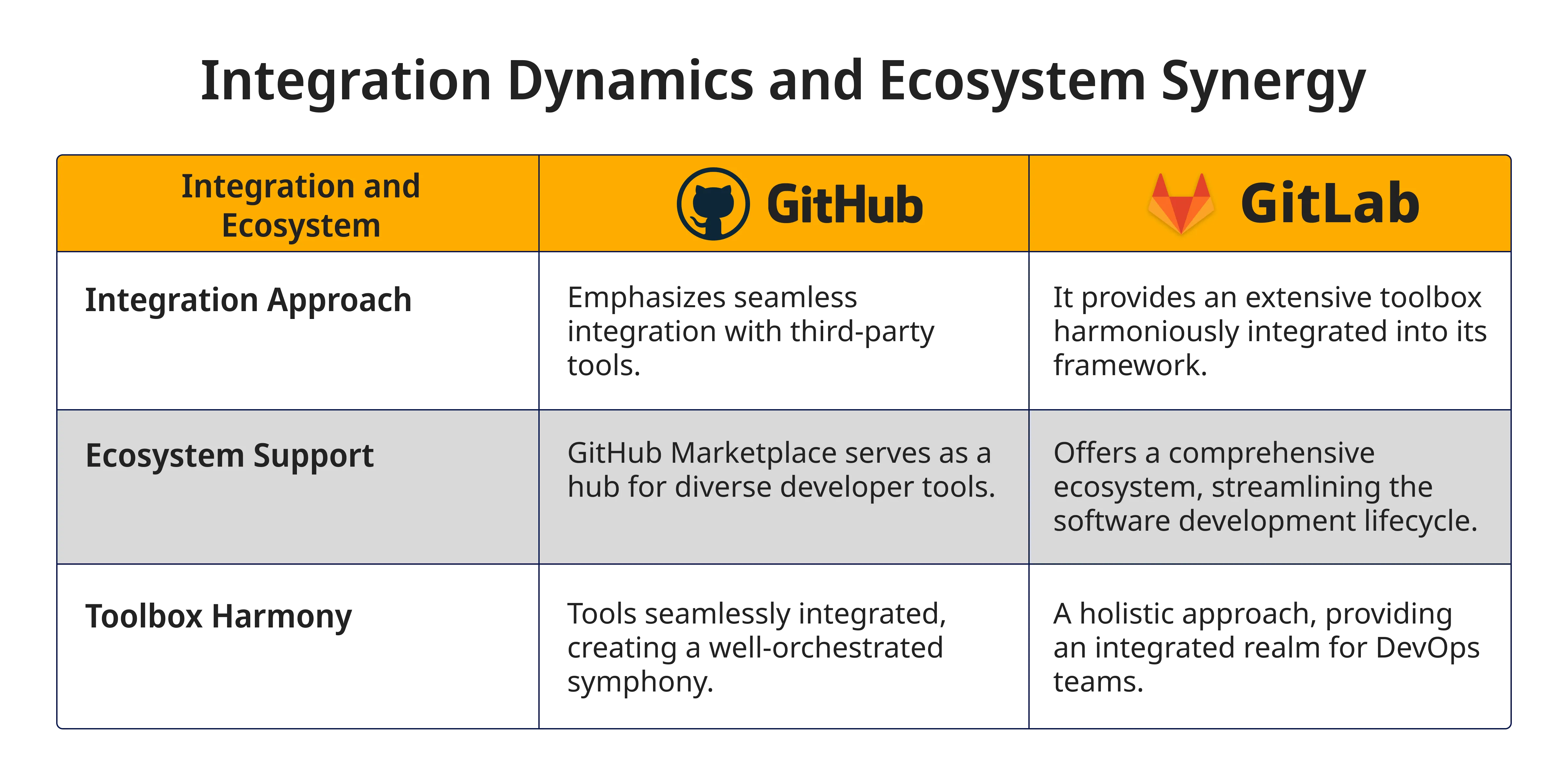Version control with Git enables developers to collaborate and manage code changes efficiently.
But what about remote Git repository hosting – should your company use GitHub or GitLab in 2024?
These two leaders offer robust Git platforms for repos, collaboration, and DevOps toolchains.
With Microsoft acquiring GitHub and GitLab remaining open-core, their trajectories continue evolving. So, what’s the real difference between GitLab and GitHub in 2024?
This updated guide will benchmark GitLab vs GitHub across criteria like features, access controls, CI/CD, integration ecosystems, and costs.
You’ll learn when GitHub excels for open source projects and developer communities, while GitLab provides better enterprise DevOps capabilities.
By understanding their strengths and limitations, you can make an informed choice aligned to your development workflows and business priorities.
Let’s dig in to guide your Git platform selection in 2024 and beyond!
1. Key Features Comparison
When comparing GitHub vs. GitLab showdown, it’s crucial to understand each platform’s distinctive features.
Below, we have written a detailed feature difference between GitHub and GitLab to help you understand better.
- GitHub’s
GitHub Actions, your trusty sidekick for Continuous Integration and Continuous Deployment (CI/CD). G2 crowd rated GitHub significantly higher overall than GitLab in 2023 – 4.5/5 vs 4.1/5 average.
The stalwart of version control GitHub, boasts a seamless repository management system.
- GitLab’s
83% of developers believe GitLab will overtake GitHub in market share by 2025, according to a 2022 GitLab survey.
GitLab, on the flip side, flaunts built-in CI/CD capabilities, making your DevOps dreams come true. Integrated issue tracking ensures you’re not lost in the labyrinth of project tasks.
Now, let’s decode these features a bit.
- GitHub: GitHub, in its elegant simplicity, offers repository management that’s a breeze. Whether you’re a solo coder or part of a massive team, GitHub’s got your back. And then there’s the star of the show—GitHub Actions. Imagine a diligent robot doing your CI/CD bidding, saving you from the hassle.
- GitLab: GitLab, on the other hand, embraces the power of integration. CI/CD is not an afterthought; it’s woven into GitLab’s DNA. Picture this: a one-stop shop where issue tracking is seamlessly connected to your code. It’s like having a personal assistant for your project organization.
Between GitHub and GitLab, the choice concerns your project’s needs and your team’s preferences.
GitHub for its sleek simplicity, or GitLab for its all-in-one DevOps arsenal. Decide wisely as the GitHub vs. GitLab saga continues.
Simplify decisions with ValueCoders. Optimize your DevOps journey.
2. Community and Support
In the GitLab vs. GitHub dilemma, the support and community aspect can be the compass guiding your journey.
- GitHub
GitHub’s community is a bustling marketplace of ideas, with active participation in open-source projects. Forums on GitHub are virtual town halls where developers exchange insights, problems, and solutions.
- GitLab’s
GitLab’s community engagement goes beyond the screen, contributing significantly to open-source initiatives. A network of support channels ensures that every query is secured, fostering a collaborative environment.
Let’s dissect these aspects.
- GitHub’s Virtual Town Square
GitHub’s community resembles a vibrant marketplace where ideas are the currency. The platform hosts a multitude of open-source projects, creating a dynamic ecosystem.
Venture into GitHub forums, and you’ll find a virtual town square—a lively space where developers share experiences, troubleshoot challenges, and celebrate victories.
https://youtube.com/watch?v=5RxXEJCVYPg%3Ffeature%3Doembed
- GitLab’s Collaborative Oasis
When discussing GitLab, community engagement extends beyond code contributions. The platform actively participates in open-source endeavors.
Support is an integral part of GitLab’s community. Whether through forums, discussions, or collaborative projects, GitLab ensures no query remains unanswered.
Now, in deciding between GitLab vs. GitHub, consider the support ecosystem that aligns with your needs. You can also consult a software development company to make the right choice.
GitHub for a bustling community or GitLab for solid collaboration.? The choice is yours as the GitHub vs. GitLab comparison continues.
Collaborate effortlessly with the ValueCoders team to make the right choice.
3. Pricing and Scalability
In the GitHub vs. GitLab showdown, understanding the financial landscape and scalability options can be the linchpin of your decision-making process.
- GitHub’s Price Point
GitHub presents a spectrum of pricing plans, catering to both individual developers and enterprise-level teams. The platform offers free plans for public repositories, making it an attractive starting point for many.
- GitLab’s Pricing Palette
GitLab, too, unfolds a range of pricing plans, accommodating the needs of various user types. The inclusive nature of GitLab’s pricing structure includes features that might come as add-ons on other platforms.
Now, let’s break down these aspects a bit further.
GitHub’s Financial Avenues
- GitHub’s pricing plans resemble a well-organized financial district. From free plans for open-source enthusiasts to scalable options for enterprises,
- GitHub’s spectrum caters to diverse financial landscapes. It’s not just about repositories; it’s about providing avenues for growth and collaboration.
GitLab’s Inclusive Framework
- Enter GitLab’s pricing landscape, where inclusivity takes center stage. The platform’s pricing structure offer more without hidden costs.
- What might be an additional charge elsewhere is often included seamlessly in GitLab’s comprehensive plans, fostering an environment where scalability is synonymous with flexibility.
As you navigate the GitHub vs. GitLab terrain, consider your financial roadmap and scalability aspirations. Several web application testing services in India can deliver you quality services at reasonable costs.
GitHub, with its diverse financial district, or GitLab, with its inclusive framework? The choice awaits as the GitHub vs. GitLab narrative unfolds.
Scale smart with ValueCoders with affordable, scalable solutions.
4. Integration and Ecosystem
In the GitLab vs.GitHub debate, understanding the integration capabilities and overall ecosystem is like surveying the technological landscape.
Let’s understand how both versions can help you with continuous integration and delivery.
- GitHub’s Seamless Fusion
GitHub thrives on seamless integration, effortlessly intertwining with various third-party tools. GitHub Marketplace is a testament to its commitment to a well-rounded developer ecosystem.
- GitLab’s Integrated Realm
GitLab mirrors this integration sentiment, offering an extensive toolbox harmoniously integrated into its framework.
DevOps teams find solace in GitLab’s comprehensive ecosystem, streamlining their software development lifecycle.
Also read: A Complete Guide On Software Product Development Lifecycle
Now, let’s deconstruct these elements a bit more.
GitHub’s Integration Prowess
GitHub’s forte lies in its ability to fuse with external tools seamlessly. For project management, issue tracking, or CI/CD.
88 percent of developers who use GitHub Copilo (an AI-powered code completion tool developed by GitHub in collaboration with OpenAI, assisting developers by generating code suggestions as they write.) say that it helps them to be more productive and finish projects faster.
The GitHub Marketplace is a hub that provides developers with many options to augment their workflows. Businesses can also consider Amazon AWS Cloud Computing services for GitHub integration.
GitLab’s Holistic Approach
GitLab adopts a holistic approach, providing an integrated realm where every tool has its place. DevOps teams, in particular, find GitLab to be a one-stop shop.
From version control to CI/CD and beyond, GitLab’s ecosystem simplifies the intricacies of the software development journey.
As you navigate the GitHub vs. GitLab landscape, weigh the integration options that align with your development needs. To do this efficiently, hire dedicated developers and void the common pitfalls.
GitHub, with its seamless symphony, or GitLab, with its holistic toolbox? The decision rests in your hands as the GitHub vs. GitLab unfolds.
Harness GitHub or GitLab power by connecting with our experts.
5. Decision-Making Factors
In the GitHub vs. GitLab dilemma, the decision-making process is like selecting the right tool for a precise job.
Consider these factors as your compass in this technological landscape.
1. Team Dynamics
- GitHub: Ideal for teams of all sizes with its intuitive interface and seamless collaboration features.
- GitLab: Emphasizes collaboration with integrated tools, suitable for DevOps-centric teams.
2. Project Requirements
- GitHub: It is simple, making it perfect for straightforward projects and open-source contributions.
- GitLab: Excels in all-in-one solutions, catering to projects with intricate CI/CD needs and integrated workflows.
3. Future Scalability
- GitHub: Offers scalability with different pricing tiers, allowing for growth as your team expands.
- GitLab: Presents an inclusive framework, ensuring scalability without hidden costs for added features.
Now, let’s dissect these factors a bit more.
Optimal GitHub or GitLab solutions simplified with ValueCoders.
4. Navigating Team Dynamics
- GitHub: Consider the size and collaborative nature of your team. With its user-friendly interface, GitHub is a go-to for teams of any size.
- GitLab: Conversely, GitLab’s integrated tools make it a haven for DevOps teams aiming for seamless collaboration throughout the development lifecycle.
5. Project-Specific Requirements
Project complexity plays a pivotal role. GitHub’s simplicity is a boon for straightforward projects and open-source endeavors.
In contrast, GitLab’s all-in-one approach is a blessing for projects with intricate CI/CD requirements, streamlining workflows effortlessly.
Planning for Future Growth
Looking ahead, scalability is crucial. GitHub’s tiered pricing model allows scalability tailored to your team’s needs.
Meanwhile, GitLab’s inclusive framework ensures scalability without additional costs, offering a comprehensive toolkit for development endeavors.
As you stand at the crossroads of GitLab Vs GitHub, let team dynamics, project specifics, and future scalability be your guiding lights.
Whether it’s GitHub’s simplicity or GitLab’s all-encompassing embrace, the decision lies in understanding the unique needs of your software development journey.
The support of application testing and Quality Assurance services is always an excellent choice to safeguard your project from unforeseen challenges.
Conclusion
When it comes to GitLab vs GitHub, there is no one-size-fits-all answer. Consider your team’s workflows and priorities.
GitHub offers a thriving open-source community, ubiquitous popularity, and seamless integration with third-party tools.
But GitLab touts deeper DevOps capabilities and a richer feature set for agile product development.
Evaluate which platform aligns better with your use cases – GitHub for open-source collaboration versus GitLab for advanced continuous integration and delivery pipelines.
Factor in migration feasibility from existing systems as well.
Remember to consider each platform’s long-term direction and investment.
The good news is you can even utilize both GitHub and GitLab as part of a diverse cloud computing technology stack.
Many organizations maintain code on GitHub while leveraging GitLab for internal project management. Consult with a web development company like ValueCoders to make the right decision.
Understanding the core contrasts in collaboration features, integrations, CI/CD capabilities, and community orientation allows you to determine the right platform balance based on your technical environment and team needs in 2024 and beyond.
There is no one-size-fits-all answer – only what works best for your unique requirements.










